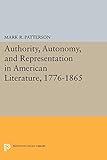Authority, Autonomy, and Representation in American Literature, 1776-1865 / Mark R. Patterson.
Material type: TextSeries: Princeton Legacy Library ; 928Publisher: Princeton, NJ : Princeton University Press, [2014]Copyright date: ©1988Edition: Course BookDescription: 1 online resource (280 p.)Content type:
TextSeries: Princeton Legacy Library ; 928Publisher: Princeton, NJ : Princeton University Press, [2014]Copyright date: ©1988Edition: Course BookDescription: 1 online resource (280 p.)Content type: - 9780691601854
- 9781400859627
- American literature -- History and criticism -- 1783-1850
- American literature -- History and criticism -- 19th century
- American literature -- History and criticism -- Revolution, 1775-1783
- American literature -- 1783-1850 -- History and criticism
- American literature -- 19th century -- History and criticism
- American literature -- Revolution, 1775-1783 -- History and criticism
- Authority in literature
- Autonomy in literature
- Politics and literature -- United States
- Politics and literature -- United States
- Representative government and representation in literature
- LITERARY CRITICISM / American / General
- 810.9002 19
- PS217.P64
- online - DeGruyter
- Issued also in print.
| Item type | Current library | Call number | URL | Status | Notes | Barcode | |
|---|---|---|---|---|---|---|---|
 eBook
eBook
|
Biblioteca "Angelicum" Pont. Univ. S.Tommaso d'Aquino Nuvola online | online - DeGruyter (Browse shelf(Opens below)) | Online access | Not for loan (Accesso limitato) | Accesso per gli utenti autorizzati / Access for authorized users | (dgr)9781400859627 |
Frontmatter -- CONTENTS -- PREFACE -- INTRODUCTION -- ABBREVIATIONS OF FREQUENTLY CITED WORKS -- Part One. The Post-Revolutionary Period -- Chapter One. Benjamin Franklin and the Authority of Imitation -- Chapter Two. Hugh Henry Brackenridge and Representation -- Chapter Three. Charles Brockden Brown, Authority, and Intentionality -- Part Two. The Antebellum Period -- Chapter Four. Myth from the Perspective of History: James Fenimore Cooper and Paternal Authorities -- Chapter Five. Ralph Waldo Emerson and the American Representative -- Chapter Six. Herman Melville: The Authority of Confidence -- Conclusion -- Index
restricted access online access with authorization star
http://purl.org/coar/access_right/c_16ec
From the Revolutionary War to the Civil War, a familiar scene appears and reappears in American literature: a speaker stands before a crowd of men and women, attempting to mitigate their natural suspicions in order to form a body of federated wills. In this important study of the relationship of literature and politics, Mark Patterson argues that this scene restates political issues in literary terms and embodies the essential problems of American democracy facing both politicians and writers: What is autonomy? How does representation work? Where does true authority lie? Beginning with the debate over ratification of the United States Constitution, Patterson follows out the complex literary consequences of these questions.A work of literary history and criticism, this study also offers valuable insights into matters of political and literary theory. In separate chapters on Benjamin Frankin, Hugh Henry Brackenridge, and Charles Brockden Brown in the post-Revolutionary period and on Fenimore Cooper, Emerson, and Melville in the antebellum period, Patterson provides a series of brilliant readings of major texts in order to describe how American writers have conflated political and literary concerns as a means to their own social authority.Originally published in 1988.The Princeton Legacy Library uses the latest print-on-demand technology to again make available previously out-of-print books from the distinguished backlist of Princeton University Press. These editions preserve the original texts of these important books while presenting them in durable paperback and hardcover editions. The goal of the Princeton Legacy Library is to vastly increase access to the rich scholarly heritage found in the thousands of books published by Princeton University Press since its founding in 1905.
Issued also in print.
Mode of access: Internet via World Wide Web.
In English.
Description based on online resource; title from PDF title page (publisher's Web site, viewed 30. Aug 2021)


